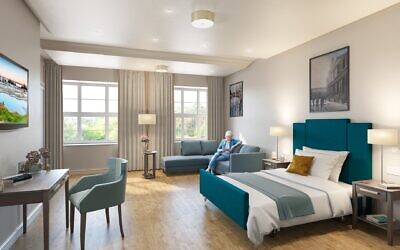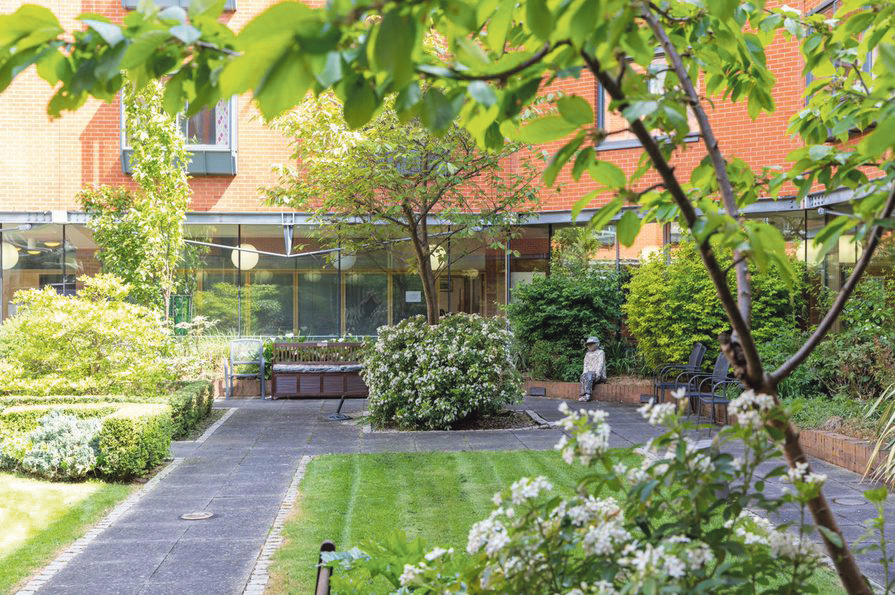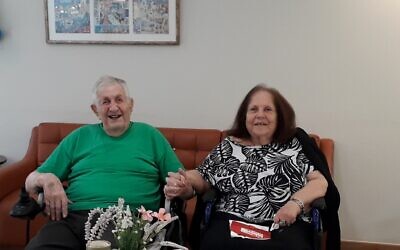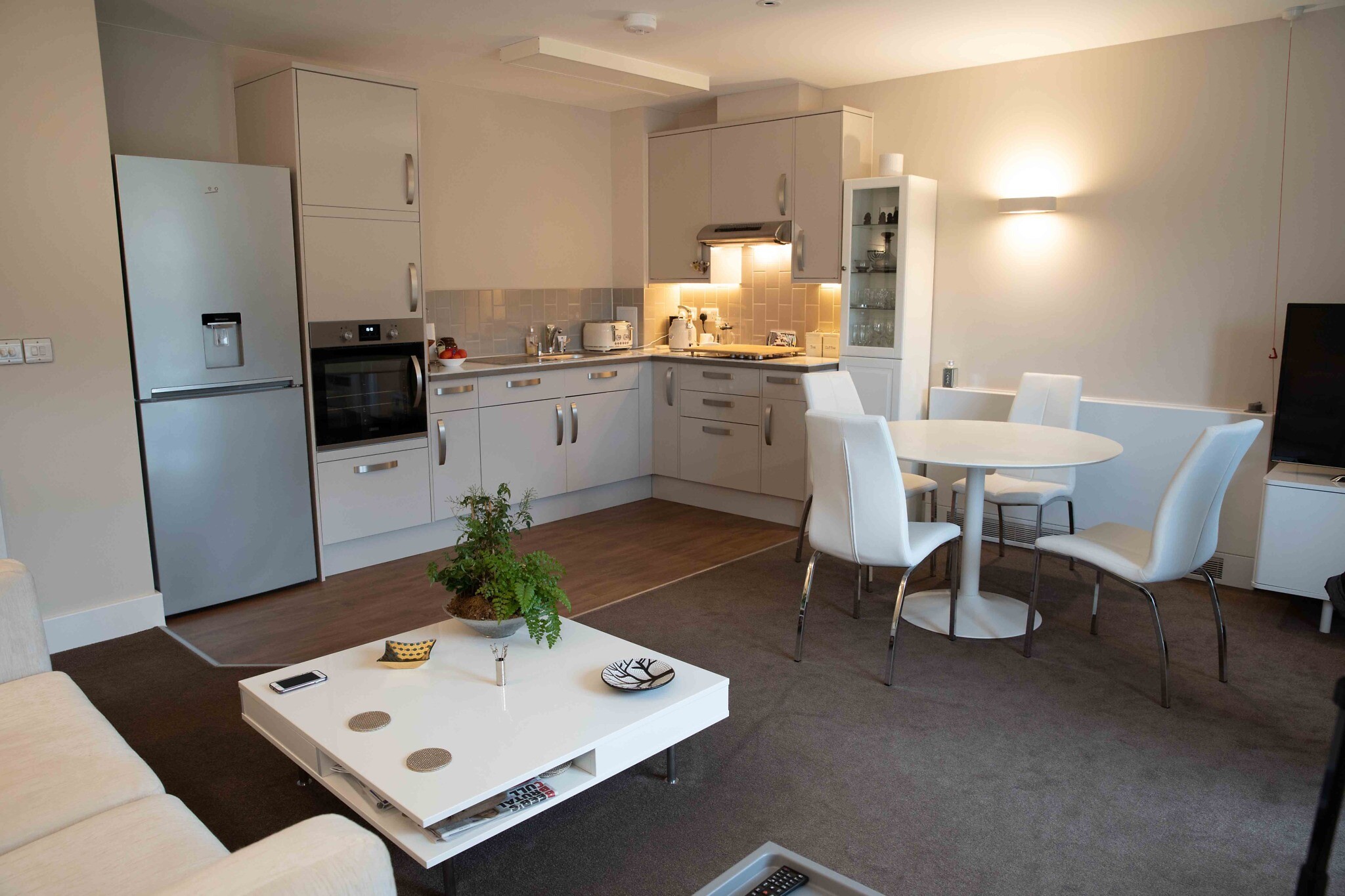
Home is where the art is
I clocked them as soon as I entered the beautiful new Loveday home on Abbey Road. Striking, brightly coloured paintings on the walls, a mixture of abstracts and local scenes. The Loveday Arts curriculum, run by artist-in residence Grace Holliday, is one of a number of activities on a programme developed in conjunction with the University of West London, working alongside artists, scientists, technology, hospitality and design staff. The programme draws on neuroscience and psychological evidence showing that stimulating activities involving art, music, language learning and storytelling improve interactions, mood and mobility for people living with dementia, Parkinson’s and other conditions.
Improving life for people with complex nursing needs is at the core of what Loveday does. As London’s only private members club catering for seniors at every stage of the ageing journey, it combines individualised care with the very best in world class hospitality. Would we really expect anything less from founder Laurence Geller CBE, chairman of the Alzheimer’s Society’s National Dementia Appeal? Geller has spent his life working in the world of hospitality, notably at one time owning Four Seasons and Ritz Carlton hotel groups but watching both his parents suffer with the effects of dementia spurred him to change direction. Working alongside his son Guy, who has experience of running care homes, he established Loveday in 2015.
Get The Jewish News Daily Edition by email and never miss our top stories
Free Sign Up
Bedroom at Loveday Abbey Road
The Abbey Road home is the third one to open after Kensington and Chelsea. Its location in St John’s Wood means that it is in the hub of Jewish north London. All dietary requirements can be catered for and activities will be geared around the various Jewish holidays. At Loveday homes there are no set visiting times, food and drink is available all day and even pets are allowed in to visit. As a former chef, Laurence’s philosophy is the if you eat better you live longer. Three-course meals worthy of a Michelin star, with wines to match, are served every night, plus there are themed evenings, lots of variety at lunch and food and drink are available all day. An open kitchen gives the chef and the residents the opportunity to interact.
A rigorous health assessment results in a personalised care plan, with one carer to every two people. The 26 large bedrooms are oases of calm, with hospital beds upholstered in rich velvet and made up with beautiful sheets. Custom-made furniture has been carefully designed to suit the demographic, for example as older people use chair arms to leverage themselves up and down and they are sturdy enough and at the right height. There is a lounge on each floor so residents don’t need to stay in their rooms or receive visitors in them. The dining area opens onto a beautiful, safe (eg no toxic plants) sensory garden with lots of seating a, water feature and potting shed
It’s not all about the comfort and the aesthetics. Loveday pioneers many research projects and employs advanced technology to prevent falls, reduce sleep disturbance and improve care. “Loveday provides care without compare,” says Laurence. “It’s about being the best we can be.”
lovedayandco.com
 Making a care home feel like home
Making a care home feel like home
Jewish Care’s Liz Linder, who heads up the Living with Jewish Care team, knows that it can be daunting moving to a care home. “We are here to support, reassure, guide and answer questions for people and their relatives who are considering moving into a Jewish Care home,” she says. “We do everything we can to help to make what can be a difficult time as smooth a transition as possible.
A care assessor meets each person and their relatives to assess their needs. The Family Carers Team is on hand for relatives, who as carers, often benefit from additional support at this time.
“We arrange for a visit and take prospective residents to view care homes that would suit their care needs, or if the person isn’t able to visit themselves, we’ll invite their family to visit,” says Liz. “They’ll get a feel for the people and the place and find out more about life in the care home. They’ll meet the home’s manager and staff and gain an understanding of the care they’ll receive, who will be caring for them and the variety of activities available for them, depending on their interests, to promote wellbeing, stimulating both body and mind.”
Residents are encouraged to bring in small pieces of furniture, framed photos, pictures for the walls, TV, radio, and anything to make their new space personal to them. Visits from family, friends and even pets are encouraged.
Rachel Jones, Jewish Care’s Director of Care, Housing & Hospitality says: “Understanding the lives that our residents lived before they came into care is key to ensuring that people are cared for in a meaningful way. We ask for the help of the wider family members to engage with us and tell us as many details as possible so we can understand as much as we can about a person. This open communication helps staff get to know a resident and their families and in turn can result in caring interactions and the forming of relationships.

Ralph and Rose Gellar
Whenever possible, the aim is to accommodate couples together. Ralph Gemal, 88, and his wife Rachel live at Jewish Care’s Stella & Harry Freedman House at The Betty and Asher Loftus Centre in Friern Barnet . He says: “The care home I have moved into is outstanding. The carers look after me and treat me with respect and we like to have a laugh and a joke. It felt like home very quickly and when I arrived, I made friends straightaway during dinner. My wife is living on the first floor, which has specialist care for people living with dementia.”
jewishcare.org

Jewish Blind & Disabled apartment
Enabling independence
There are 13.9 million disabled people in the UK, yet only a staggering seven percent of homes in England are accessible. More than half of those requiring an adaptation do not have the facilities they need. As a result, many people with disabilities are living in unsuitable housing and not surprisingly, 38 percent of people who have a long-term physical condition also experience severe mental health problems.
Jewish Blind & Disabled transforms the lives of Jewish adults who have aphysical disability and/or vision impairment, through independent living and support in specially adapted mobility apartments or within someone’s own home in the wider community.
The developments are specially designed to enable people to do the everyday tasks that are key to living independently, in safety with their own front door with house managers onsite 24/7. Work is underway on an eighth building, in Mill Hill East, which will provide 30 much-needed mobility apartments.
An Independent Living Advisory Service takes the expertise into people’s own homes for those who are not looking to make a move. The service both advises and funds the installation of vital aids and adaptations that can help transform someone’s home into a healthy home that supports their needs.
jbd.org
https://www.jewishnews.co.uk/new-care-home-opens-in-north-london/





